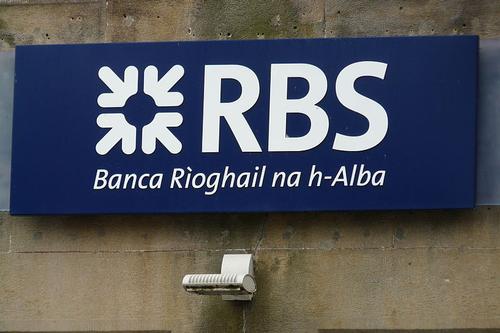SCOTLAND
Language

Language
Cities in SCOTLAND
| Edinburgh | Glasgow |
Popular destinations UNITED KINGDOM
| England | Northern ireland | Scotland |
| Wales |
Language
 Gaelic RBS LogoPhoto: Chandres CC 3.0 Unportedno changes made
Gaelic RBS LogoPhoto: Chandres CC 3.0 Unportedno changes made
The official language is dominated by its own form of Standard English, also known as Standard Scots. Nevertheless, Scotland historically belongs to four language spheres:
a. (Scottish) Gaelic (Ghàidhlig, English: Gaelic or Erse), is one of the Celtic languages and is still spoken and used as a church language in the Highlands and the Hebrides. Scottish Gaelic (gallic), akin to Irish, is one of the oldest languages in Europe. Gaelic is still spoken by about 80,000 Scots, but also by overseas Scots. It is a branch of the Indo-European language family, which includes Irish, Manx (the language of the Isle of Man), Welsh, Cornish (the language of Cornwall) and Breton.
Scottish Gaelic came to Scotland in the 3rd century from Northern Ireland (then: Scotia) with the Scots. In the 11th century it was spoken almost everywhere in what is now Scotland, but ceased to exist as the language of the Scottish court around that time. In the following centuries, Gaelic was spoken by fewer and fewer people in Scotland and gradually supplanted by English.
Gaelic even became a language of extinction, but now more and more young Scots are choosing to learn the language of their ancestors. Gaelic is also taught at many primary schools. In Argyll, on the Isle of Skye and on the Hebrides, all public designations are bilingual, and on Skye, Gaelic vocational training is provided.
b. (Lowland) Scottish, up to about 1600 the national language, of which spoken forms (Broad Scots, Lallans) still live on as dialects, also used literary from the 18th century, in the 20th century also as a lexically mixed poet language. Even in its purest form, Lowland Scots are very similar to Standard English in grammar, but in terms of vocabulary and pronunciation, the two languages are very different. The Lowland Scots used to be spoken in the south and east, currently only in the northeast of Scotland. The most famous Scottish writer was the poet Robert Burns (1759-1796).
c. Norn, a Norwegian dialect in Caithness and on the Orkney and Shetland Islands, died out in the 18th century.
In Shetland, by the way, a mixture of Old Norse, English and Scottish is spoken, moreover, laced with German and Dutch terms.
d. English or "Inglis", emerged as a writing, gradually as a spoken and spoken language, mainly as a result of the Reformation (1560), the departure of king and nobility to London (1603) and the political union with England (1707).
Scottish English is a strong, locally different dialect, in which not only the "r" rolls and the "g" is not pronounced "k" in England, but also many words derived from Gaelic.
Some Gaelic words and expressions:
Good morning = madainn mhath
Good night = Oidhche mhath
Thank you = tapadh leat
Cheese = càise
Meat = feòil
Vegetable = glasraich
Beer = leann
Whiskey = uisge beatha
Many towns and villages have both an English and a Gaelic name:
Benbecula = Beinn Na Faoghla
Butt of Lewis = Rubha Robhanais
Castlebay = Bagh a’Chaisteil
Flodigarry = Flodaigearraidh
Harris = Na Hearadh
Kilmuir = Cille Mhoire
Leverburgh = An t-Ob
Stornoway = Steornabhagh
Tarbert = An Tairbeart
Sources
Berkien, G. / Schotland
Kosmos-Z&K
Berkien, G. / Schotland
ANWB
Larrimore, D. / Schotland
Kosmos-Z&K
Levy, P. / Scotland
Marshall Cavendish
Patitz, A. / Schotland
Van Reemst
Schaff, B. / Schotland
Kok Lyra
Schotland
Cambium
Schotland
Lannoo
Schotland
Michelin Reisuitgaven
Schotland
Van Reemst
Smallman, T. / Scotland
Lonely Planet
Stoks, F.T. / Schotland
Gottmer
Summers, G. / Schotland
Van Reemst
Tschirner, S. / Schotland
ANWB
Wamel, D. van / Schotland en Noord-Engeland
Babylon-De Geus
CIA - World Factbook
BBC - Country Profiles
Last updated January 2026Copyright: Team The World of Info